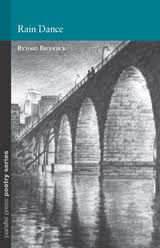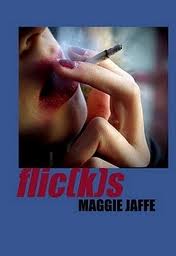Book Review
Rain Dance by Richard Broderick, Parallel Press, 2010. $10
Flic(k)s: Poetic Interrogations of American Cinema by Maggie Jaffe, Red Dragonfly Press, 2010. $15
Reviewed by Judy Barisonzi
Perhaps you like tender poems about the beauty of the spring woods, or the warmth of parental love? In that case, you won’t be interested in these chapbooks. But if you want poems that offer a cutting-edge critique of American culture, then Rain Dance, by Richard Broderick, and Flic(k)s, by Maggie Jaffe, are for you.
Let’s start with Rain Dance, the more traditional of the two, published by UW’s Parallel Press. Broderick doesn’t have a cheery perspective on the world. Mostly he sees imperialist war, environmental pollution, and “the litter of abandoned lives” (“At the Auto Junkyard”). When he looks at his fellow humans he sees cruelty, greed, loneliness. Writing about California, for example, he sees history
buried now beneath 12 lanes of concrete whose
cloverleaf exchanges turn back upon themselves
like the thoughts of a mind so cut off from the world
they have no place else to go. (“North of San Diego,” p. 16)
He contrasts an anti-abortion protestor’s rosy picture of
a little fetus floating happily
in the golden light of mommy’s tummy
with
the times that lie ahead, of spilled food,
bad report cards, the sound of his parents’ curses,
the silence at the dinner table that seems
to cast a spell backward over the years,
past the bright birthday candles, the photo
album’s fixed smiles, to communicate
the words all children will eventually mutter,
“I wish I’d never been born” (“The Protestor,” p. 26)
In what I found the strongest poem, the poet’s grandmother, nearing death, relates a childhood memory of being forced by her father to watch while he tortures the family dog; the poem then shifts to tell how this experience led her to an unhappy marriage and loveless life: she
married a man whose anger
was cold, unlike her father's.
Fifty years, they lived without warmth (“A Dog’s Life,” p. 27).
There doesn’t seem to be much hope for humanity. In “Hardly Paradise,” Adam and Eve return to the garden, where they
regret, a little, all the fighting and the killing,
the young men maimed in body and spirit
during our great military campaigns,
the multitude of failed marriages, the neglected children,
the drinking and lynching and midnight barn burnings,
the insomnia and depression, the lying and infidelity,
the years of therapy, the lack of love,
the kind word that might have made all the difference
if only we’d spoken it, the bitterness
of broken promises, the years spent nursing grudges . . (p. 33).
It’s a bad world all around, though Broderick, toward the end of the collection, allows us a few glimmers of hope: the “shining faces” of refugee students from Liberia, "free for now from the nightmares/they write about in composition class" (“African Students at the Community College,” p. 29), and even offers a rather sentimental image of
our faces raised
toward a vision
of heaven that,
for once,
we can all share (“Lunar Eclipse,” p. 35)
or of the stone arch bridge in Minneapolis, seeing it as
a bridge that we
might cross to embrace each other. (“The Stone Arch Bridge,” p. 37)
Note the linguistic qualifications, however: “for now,” “can” and “might.” Reading Broderick, I’m reminded of A.E. Housman:
while the sun and moon endure
Luck’s a chance, but trouble’s sure ("Terence, This Is Stupid Stuff")
I don’t know that we see even that chance of luck in Maggie Jaffe’s Flic(k)s: Poetic Interrogations of American Cinema (Red Dragonfly Press), a much more complicated book, and one that will intrigue film buffs. It’s a chapbook made up of poems and prose poems about classics of Hollywood cinema (and some less known films), interspersed with mostly cynical quotes from directors and others (such as Billy Wilder’s, "Awards, they‘re like hemorrhoids. Sooner or later every asshole gets one," p. 23). There are also research notes, excerpts from interviews and other sources—a montage of approaches to Hollywood history.
But Jaffe is not writing a celebration of the American film industry. Instead, she summarizes the plot of a film, then juxtaposes it to the “real world” of its time: Japanese concentration camps, the development of the atomic bomb and its tragic consequences (see p.63), the war in Vietnam. For instance, Jaffe ends a poem about the film “Cat People” with the line “In Auschwitz, crematoriums burn night and day” ("Cat People," p. 9), then on the next page offers a quote from Josef Goebbels’ diary:
We see the American Disney film Snow White, a magnificent artistic
achievement. A fairy tale for grown-ups, thought out into the last detail
and made with a great love of humanity and nature. An artistic delight!
Irony such as this is the dominant mood of Flic(k)s, an irony that often relies on the deliberate use of cliche. Here’s an example: in "Sign of the Times," the first poem in the collection, the title refers to the fate of Peg Entwistle (you’ll have to read the book to find out who she is), but it also relates to the famous HOLLYWOOD sign, which is a key part of Entwistle’s story. Other clichés Jaffe uses are Mom’s apple pie:
After Psycho, nothing was the same.
Not the comfort of showers,
nor Mom’s down-home
apple pie. Prophetic.
Within three years America
will eat her young: the skull beneath her smirk
metastasizing into a diminutive
southeast Asia. (“Psycho,” p. 13)
or amber waves of grain:
amber waves of bleached-out
Levis on the line, Karen [Silkwood] softly humming
“Amazing Grace.” Behind her, a flatbed
truck is closing fast. Fade to white. ( "Cooked," p. 46)
Above all, though, Jaffe’s irony targets racism:
The sky’s gun-metal blue,
The West all shadow and light,
not a negro in sight. (“High Noon,” p. 34)
Or
Except for Wayne, white
folks are lovable, just like
you and me. (“The Searchers,” p. 37)
Or, later in the same poem:
In 1973, Nixon awarded [actor John] Ford
the prestigious Medal of Freedom.
That same year, the Feds “neutralized”
AIM at Wounded Knee. (p. 38)
Jaffe links racism to the red-baiting that was directed at film actors, directors, and
scriptwriters, again relying on irony and cliche. She tells us, for example, that Jacques Tourneur, director of "Cat People," was "'gray-listed' as a 'nigger lover'" ("Cat People," p. 9). She mocks the American obsession with Communism, describing Janet Leigh in "Pycho":
Her D-cup tits are like twin
atomic silos, more terrifying than the Cuban Missile
Crisis and worldwide Communist domination (“Psycho,” p. 12)
Or she portrays a character in the film Silkwood:
Thelma’s a rock-bed American
who’d give you the shirt off her back,
as long as you’re white and believe
in Billy Graham (“Cooked,” p. 43f)
Thelma also says
I love you
like a daughter, but sometimes you act
like you was colored. Just ask yourself,
what would Jesus do. (p. 43)
I’ve only scratched the surface of this fascinating book, but you get the idea. Jaffe’s poems interrogate the complex relationship between Hollywood films and the American psyche. The irony, wit, careful research, and unfamiliar details revealed in Flic(k)s will keep you...I won’t say entertained, any more than Broderick’s Rain Dance will entertain you, but both books will make you think. Just as poems should.
Judy Barisonzi has been a Wisconsin resident since 1966, and she now lives among the lakes and woods of northwest Wisconsin. Semi-retired from teaching English at the University of Wisconsin Colleges, she gives workshops in creative writing and memoir writing, participates in several local writing groups, and publishes poems in local and national magazines.



